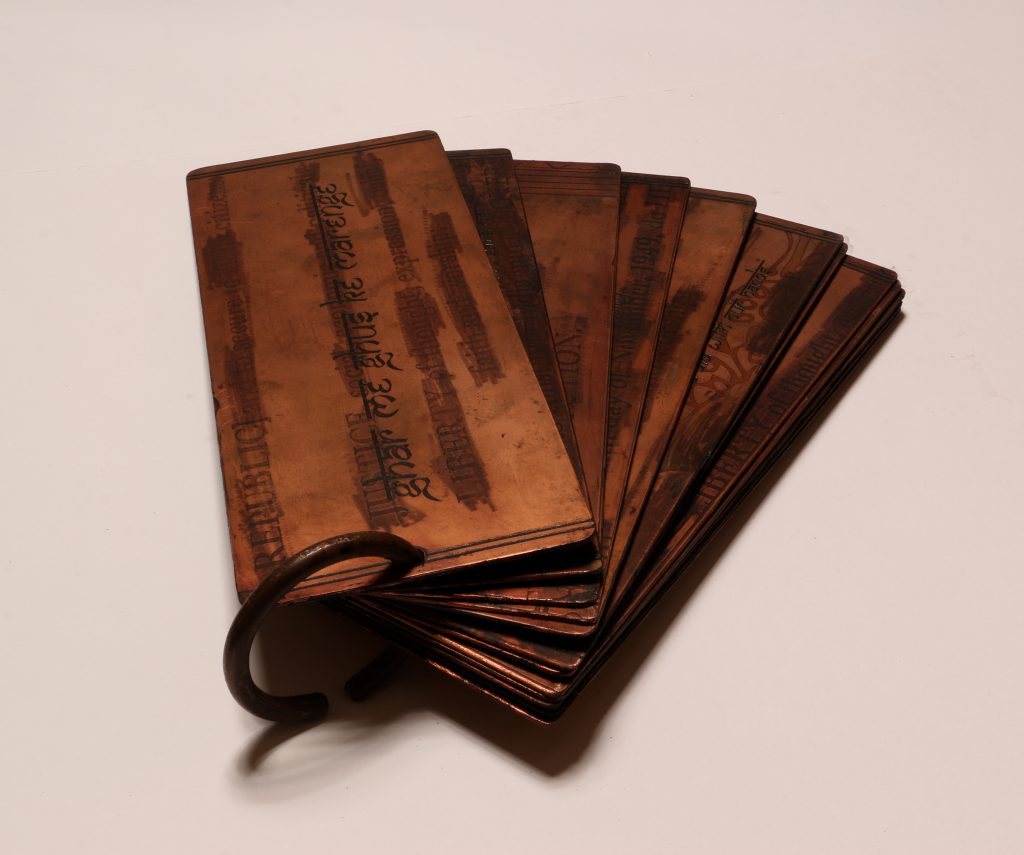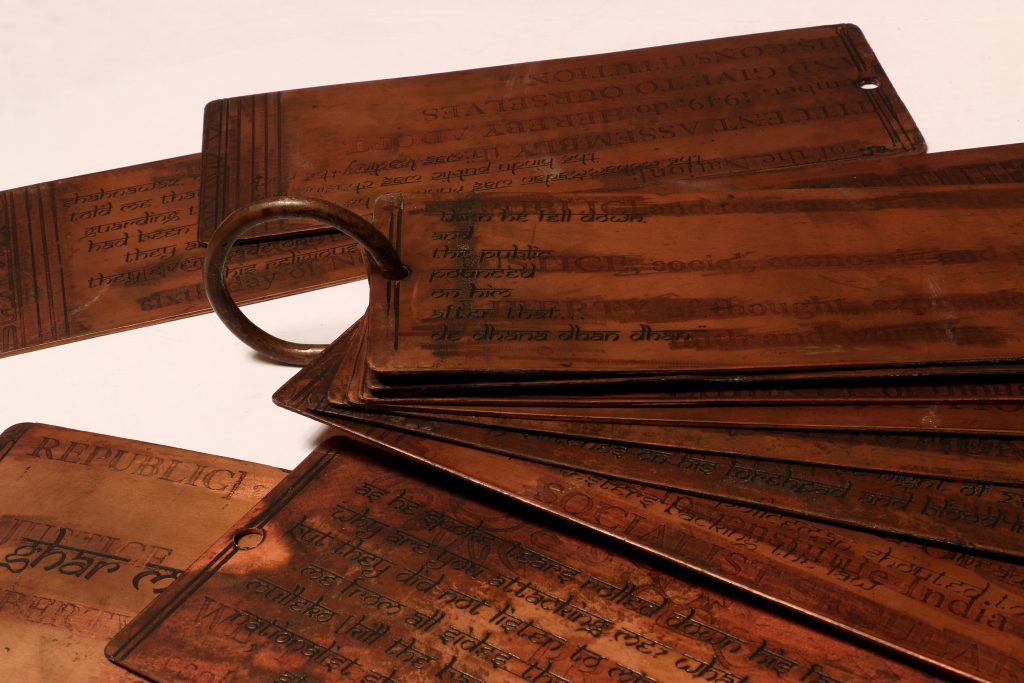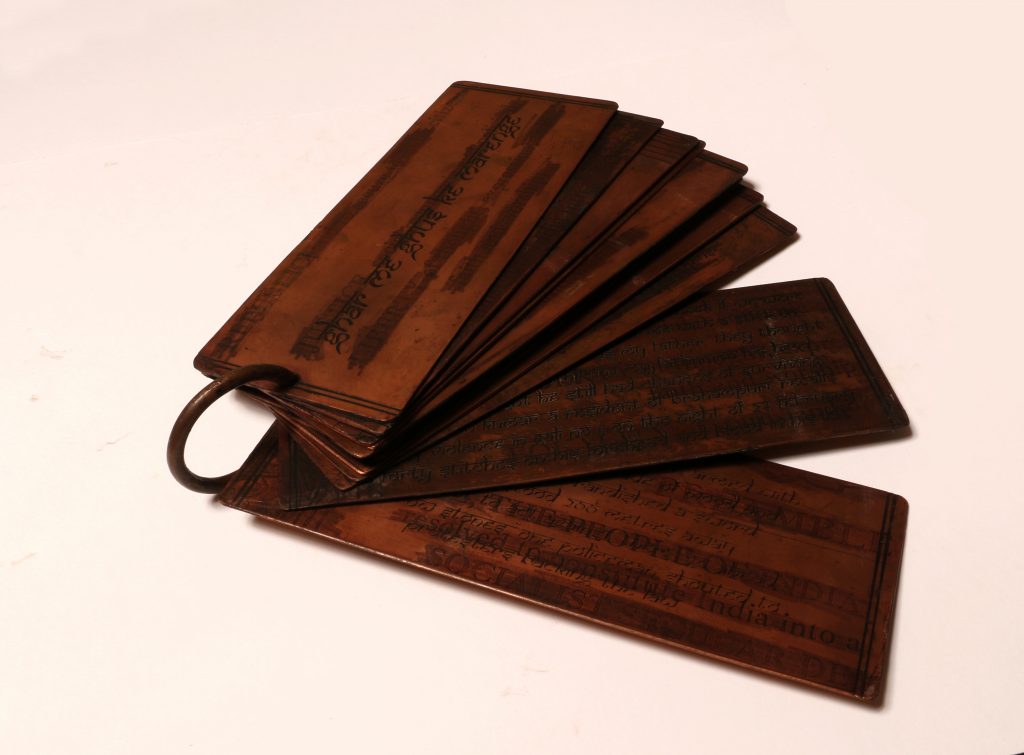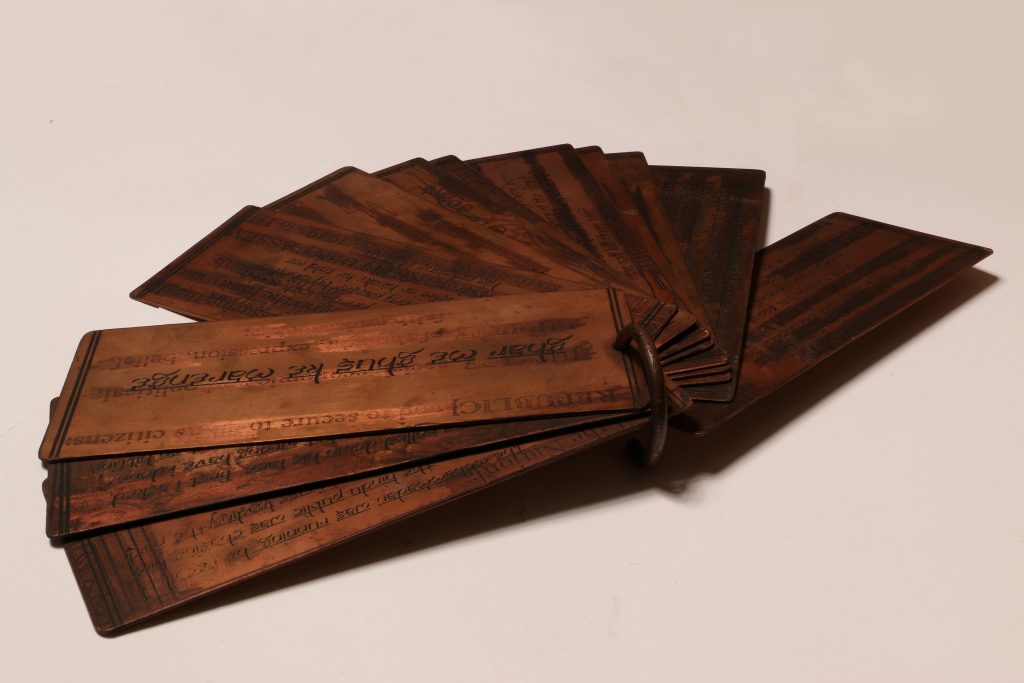Ravikumar Kashi
Bangalore, India
ravikashi.com
‘Everything will be remembered’ a palimpsest.
2020
Etched copper plate filled with printing ink, copper wire.
Each plate 5.5″ x 12”. Thickness of each plate 4mm. 12 plates. Unique edition.
Artist Statement
Background for the work:
On 30th May 2019, the Indian right wing party BJP led by Mr. Narendra Modi formed the central government for a second time. Its election campaign was replete with anti- Muslim rhetoric and sloganeering. That same year, on the 12th of December, the Government of India enacted the Citizenship Amendment Act (CAA). In the weeks following, nationwide protests calling for the repealing the CAA and the foregoing of the National Register of Citizens (NRC), which was supposed to precede CAA, were held. The Acts, in line with the BJP’s avowed agenda of reshaping India into a Hindu state, were seen as disenfranchising the Muslim community, which constitutes 14% of India’s population. The protests were largely non-violent, led by youth and women across the country. In several places, Muslim women sat for nonstop protest meetings, joined by artists and writers, who felt that the CAA and NRC were altering the secular character of the constitution. Many of these protesters were labeled anti nationals and traitors.
In early 2020, following speeches given by BJP leaders inciting their followers to attack and shoot anti-CAA protesters, riots occurred in North-Eastern Delhi. Beginning on 23 February, and caused chiefly by Hindu mobs attacking Muslims, there were multiple waves of bloodshed, property destruction, and rioting. Of the 53 people killed in three days, two-thirds were Muslims who were shot, beaten, or set on fire in the Indian capital’s deadliest Hindu-Muslim riot since 1950. The dead also included a policeman, an intelligence officer, and over a dozen Hindus. More than a week after the violence had ended, corpses were being found in open drains, even as hundreds of wounded languished in inadequately staffed medical facilities. Many Muslims remained missing as late as mid-March.
During the riots, Muslim males—who, unlike Hindus, are commonly circumcised—were at times forced to remove their lower garments in order to confirm their religion before being brutalized. The properties destroyed were disproportionately Muslim-owned and included four mosques, which were set ablaze. It was reported that during this time, the police willfully looked the other away, or even actively helped the Hindu mobs.
Work Concept:
My work is a combination of copper plates used historically for documentation and the idea of palimpsest.
Copper plates: In the Madras Museum, located in southern part of India, a series of copper plates from as early as 4th century AD have been preserved and displayed. These copper plates recorded various events of their time for posterity.
Palimpsest: a manuscript or piece of writing material on which later writing has been superimposed on effaced earlier writing; something reused or altered but still bearing visible traces of its earlier form.
In the light of anti-CAA protests and Delhi riots, I wanted to create a copper plate palimpsest for my time , so that the erasure of our constitutional values will not be forgotten. There are two layers of text in the work. In the partially erased layer seen beneath, is the preamble to the Indian Constitution, declaring its claim to secure justice, liberty, and equality to all citizens, and promote fraternity to maintain unity and integrity of the nation . That layer is being eroded, and replaced with textual details of Delhi riots, narrating the incidents of murder and rampage. There are Slogans of violence like “We will enter the house and beat you up” or “Shoot the traitors”.
The type face of the second layer of the text is an English font called Samarkan, designed to look like a Sanskrit text, and is intended to act as a visual marker for the Indian right-wing practice of quoting ancient texts to gain validation. It is also a simulation of ancient handwritten palm leaf text manuals from India.
The title for the work ‘Everything will be remembered’ comes from the title of the poem written by anti-CAA activist Aamir Azis, lines of which were also recently recited by a member of the band Pink Floyd.
Bio
Ravikumar Kashi is an artist who works in different mediums such as painting, sculpture, photography and installation. Along with these he is also engaged with artists’ books in the last two decades. His idea / concept driven artist’s books are layered and connect with his times in a poetic visual language. Memory, desire, fragility and transformation are a major concern in his works along with introspection. He has created book objects, unique handmade books and photo books.
Kashi was born in Bangalore in 1968. He completed his BFA from College of Fine Arts, Bangalore in 1988; MFA from Faculty of Fine Arts, MS University, Baroda in 1990; and MA in English from Mysore University, in 1995. He learnt handmade papermaking from Glasgow School of Art, UK. He also learnt Hanji, traditional Korean papermaking, from Jang Ji Bang, Korea.
He has held solo show of his works in Bangalore, Chennai, Hyderabad, Mumbai and Delhi in India and London – UK, Palo Alto – USA, Shanghai – China and Belforte del Chienti – Italy. He has also shown his works in various curated shows across the world in museums, biennales, art fairs and galleries. His participations include ‘Diamond Leaves’, Brilliant Artist Books from around the world, curated by Xu Bing and Marshall Weber, CAFA Art Museum, Beijing;Biennale Internationale des Arts des Fibres et du Papier, Museum of World Religion, Taiwan; 11th Asian Art Biennale, Dhaka, Bangladesh; ‘Edge of Desire’ international traveling show – curated by Chaitanya Sambrani, Art Gallery of Western Australia, Perth, Australia; Asia Society Museum, New York; Tamayo Museum, Mexico City; Museum of Contemporary Art (MARCO), Monterrey, Mexico, UC Berkeley Art Museum, Berkeley, CA.U.S.A.NGMA, Asian Art Museum of San Francisco; Royal Ontario Museum , Toronto, National Gallery of Modern Art, New Delhi and Mumbai’; Arad International Biennale of Romania; ‘Personal Histories’, curated by Robyn Faster, at Red Land Museum, Queensland, Australia; ‘Trajectories. 19-21 Century printmaking in India and Pakistan. Curated by Dr.Paula Sengupta and Camilla Cahudhury – Sharjah Art Museum, Sharjah; International Artist Book Fair, Barcelona, Spain. and Regia Emilia, Italy; 4th European International Book Art Biennale, Goa, India; Ninth Bharath Bhavan International Biennial of Print Art, Bharat Bhavan, Bhopal, India.
He has received National award from Lalit Kala Akademi, Delhi in 2001 and two awards from Karnataka Lalita Kala Academy 1990, 1999 and one from Karnataka Shilpa Kala Academy for his works in 2000. He has also received first prize in ‘Ventipertrenta’, International Festival of Digital Art 2017, from Museo Internazionale Dinamico de Arte Contemporanea, Italy.
He writes on art in Kannada and English. Two of his books, ‘Anukta’ and ‘Kannele’ have been published from Akshara Prakashana, Heggodu. His book ‘Kannele’ has received Karnataka Sahitya Academy award in 2015. His recent book ‘Flexing Muscles’ published by Relaible Copy was released in September 2019.
He teaches at RV School of Architecture and Azim Premji University as visiting faculty.





